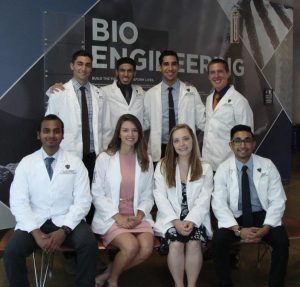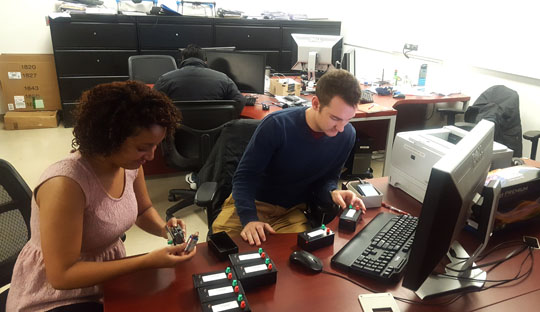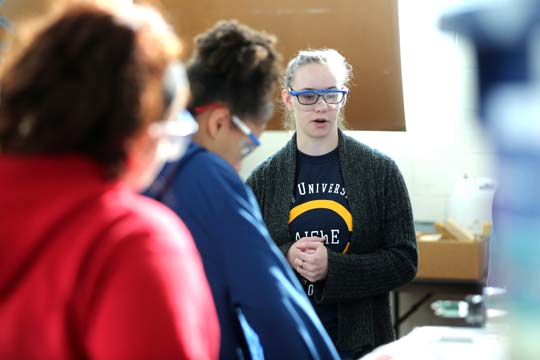Winning competitive external grants is an important element of faculty members’ road to success, and the UT Office of Research and Sponsored Programs is working to help them navigate the complexities of this progress.
The UT Scholars Institute Program has selected 38 early career faculty members to assist in their journey to promotion.
 The program will help faculty members identify sources of funding targeted to their research projects; how to prepare and submit proposals that meet various agency and foundation requirements; how to comply with federal, state and University policies and rules; and ways to write a compelling story that is likely to sway external review panels.
The program will help faculty members identify sources of funding targeted to their research projects; how to prepare and submit proposals that meet various agency and foundation requirements; how to comply with federal, state and University policies and rules; and ways to write a compelling story that is likely to sway external review panels.
The institute, which will convene in May, will consist of six monthly sessions, the topics of which are flexible to the interests of the participants.
“I am excited for the new Scholars Institute Program to launch. We had a large pool of applicants indicating a strong desire for faculty to increase their scholarly activity and grantsmanship,” said Dr. Amy Thompson, professor of public health and faculty fellow in the Office of Research and Sponsored Programs, who developed the program.
The 2017 Scholars Institute Program participants are:
• Dr. Ana Alba-Rubio, Department of Chemical Engineering;
• Dr. Wissam Abou Alaiwi, Department of Pharmacology and Experimental Therapeutics;
• Dr. Gabrielle Baki, Department of Pharmacy Practice;
• Dr. Larissa Barclay, Department of Advanced Population Care;
• Dr. Tian Chen, Department of Mathematics and Statistics;
• Dr. Carmen Cioc, Department of Engineering Technology;
• Dr. Madeline Clark, Department of Counselor Education;
• Dr. Aisling Coughlan, Department of Bioengineering;
• Dr. Allyson Day, Department of Disability Studies;
• Dr. Katherine Delaney, Department of Early Childhood, Higher Education and Special Education;
• Dr. Hamoun Delaviz, Department of Neurosciences;
• Dr. Obi Ekwenna, Department of Urology, Department of Transplantation;
• Dr. Saori Furuta, Department of Biochemistry and Cancer Biology;
• Jenn Glassman, Department of Speech Language Pathology;
• Dr. Temeaka Gray, Department of Advanced Population Health;
• Dr. Serhan Guner, Department of Civil Engineering;
• Dr. F. Scott Hall, Department of Pharmacology and Experimental Therapeutics;
• Dr. Trieu Le, Department of Mathematics and Statistics;
• Dr. Jiayong Liu, Department of Orthopaedic Surgery;
• Dr. Kimberly Mack, Department of English Language and Literature;
• Dr. Luis Mata, Department of Engineering Technology;
• Dr. Kimberly McBride, School of Population Health.
• Nicole McKenzie, Department of Exercise and Rehabilitation;
• Dr. Gigi McNamara, Department of Communication, Department of Women’s and Gender Studies;
• Dr. Peter Mezo, Department of Psychology;
• Dr. Jared Oluoch, Department of Engineering Technology;
• Dr. Megan Petra, Department of Social Justice;
• Dr. Brad Pierson, Department of Music;
• Dr. Dayanidh Raman, Department of Biochemistry and Cancer Biology;
• Dr. Isaac Schiefer, Department of Medicinal and Biological Chemistry;
• Dr. Heidi Shank, Department of Nursing;
• Dr. Vithal Shendge, Department of Orthopeadic Surgery;
• Dr. Heather Sloane, Department of Social Justice;
• Dr. Tonya Schmitt, Department of Advanced Population Care;
• Dr. Amit Tiwari, Department of Pharmacology and Experimental Therapeutics;
• Dr. Brian Trease, Department of Mechanical, Industrial and Manufacturing Engineering;
• Dr. Kasumi Yamazaki, Department of Foreign Languages; and
• Ronald Zallocco, Department of English Language and Literature




